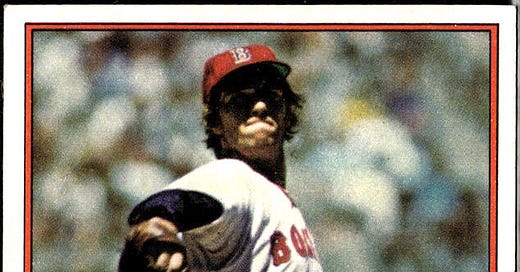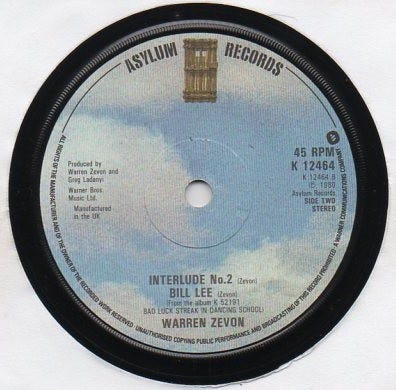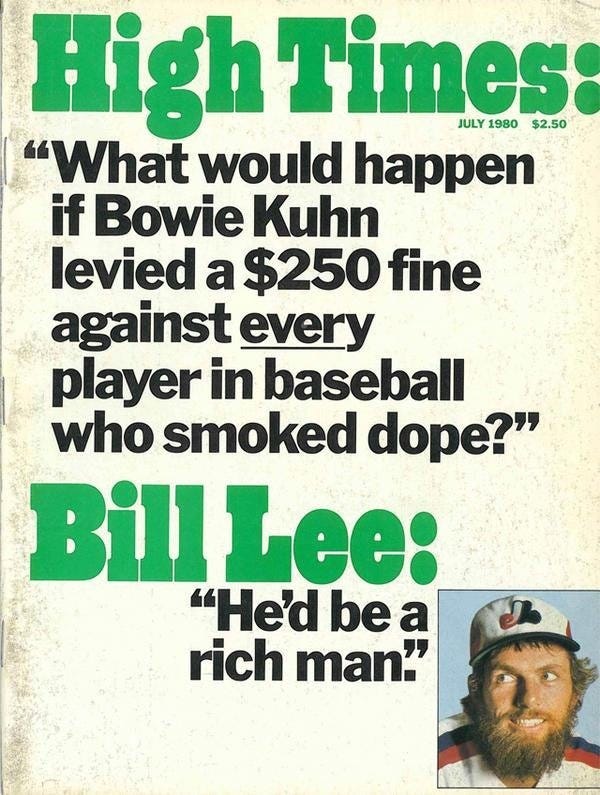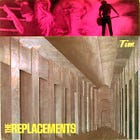Back during the first few months of 2015, thanks to my pal and colleague Rob Neyer, I beefed up Fox Sports’ pre-season baseball coverage with a weekly column called Bloop Hits, which explored the overlap between pop music and the national pastime via certain songs about certain ballplayers.
Those columns were a lot of fun to write (thanks again for the work, Rob!), and most of them are still floating around on the Fox Sports website to this day — though the site’s editors long ago lopped my byline off the pieces, because I guess media conglomerates always need to find fun new ways to screw the folks who create their content.
Warren Zevon’s 77th birthday, which fell this past Wednesday, reminded me that one of the Bloop Hits columns I wrote was about Zevon’s “Bill Lee,” his musical tribute to one of my favorite players of the 1970s. I was really pleased with how the piece came out — even more so when I received a complimentary email about it from George Gruel, Zevon’s longtime buddy, minder and “aide-de-camp,” who snapped the legendary photo of Lee and Zevon partying together during their three-day boozing session in 1979.
So, in the interest of reclaiming a piece that I’m proud of — and in giving you fine JTL supporters something fun to read while I’m in Redd Kross manuscript deadline hell — here’s that “Bill Lee” Bloop Hits column from 2015 in full, with a few slight tweaks and additions…
I’ll never forget the first time I heard Warren Zevon’s “Werewolves of London”.
It was the spring of 1978, I was a month away from my 12th birthday, and the sudden realization that someone had written a rock song inspired by old horror movies — which, along with baseball, were my main obsessions at the time — was enough to make me completely botch the Darryl Dawkins-style NERF basketball dunk I was attempting to deliver over my best friend Abbot’s head.
I wasn’t the only one picking up on what Zevon was laying down that spring. Red Sox hurler Bill “The Spaceman” Lee, already a devoted fan of such ‘70s L.A. rockers as the Eagles, Little Feat and Jackson Browne, had become an extremely vocal proponent of Excitable Boy, the Browne-produced 1978 album that (along with the Top 40 success of “Werewolves,” the LP’s third single) catapulted Zevon to stardom. Lee sprinkled nearly every interview he did that season with lyrical quotations from the album — especially the title track, which he’d adopted as something of a theme song and a personal mantra, much to Zevon’s immense delight.
“He envied and admired sports figures,” Zevon’s ex-wife and biographer, Crystal Zevon, recalled in a 2007 interview. “And when he learned that there were sports guys out there, like Bill Lee, chanting his lyrics, he loved that. To him, that was really the most exciting thing that could happen, short of [Bob] Dylan doing his songs.”
In retrospect, it makes perfect sense that Lee and Zevon should have gravitated toward each other. Born less than a month apart (Lee on Dec. 28, 1946, Zevon on Jan. 24, 1947), both men spent substantial portions of their formative years in Southern California; Lee made his college pitching debut for USC in early 1966, just a few months before Zevon’s first single — “Follow Me,” a duet with Violet Santangelo issued under the groovy mid-60s alias Lyme and Cybelle — was pressed up by L.A.’s White Whale records.
Both were well-read gents with mordant senses of humor and dim views of humanity, and both were known to experiment with various recreational chemicals. (“I can think of a lot worse things in baseball than marijuana or peyote, if used in moderation,” Lee wrote in his 1984 memoir The Wrong Stuff, which was later turned into a film called Spaceman starring Josh Duhamel. “Things such as walks, designated hitters, and astro-turf.”) Both men were smarter than most of the folks in their respective fields, and neither suffered fools gladly; characteristics which, in both of their cases, occasionally proved more detrimental than beneficial to their careers.
Lee’s endless, operatic clashes with Boston skipper Don Zimmer and the Red Sox front office (including his mid-June threat to “retire” after the team sold his buddy Bernie Carbo to the Indians) garnered a ton of ink during the summer of '78, and led to the three-time 17-game winner being dealt to the Expos that December in a classic “addition by subtraction” exchange that fetched only utility infielder Stan Papi in return. Lee made even bigger headlines the following spring, when he informed the media that he’d been using marijuana for more than a decade, a revelation that resulted in a $250 fine (later rescinded) and a stern reprimand from baseball commissioner Bowie Kuhn, who was only slightly mollified by Lee’s assertion that he didn’t actually smoke pot, but rather sprinkled it on his breakfast pancakes. Lee’s pro-marijuana stance cemented his position as a counter-cultural hero, and would eventually land him on the cover of High Times.
Zevon, who’d been following Lee’s travails in the media, was moved to write a song in his honor. But unlike most songs about ballplayers, “Bill Lee” didn’t mention the pitcher’s abilities, achievements or even his name; and unlike so many of Zevon’s songs about disreputable outsiders, this one was neither a narrative nor a colorful character study. It was short — barely more than a minute and a half long — and almost brutally succinct:
You’re supposed to sit on your ass and nod at stupid things
Man, that’s hard to do
And if you don’t they’ll screw you
And if you do they’ll screw you, too
The only actual mention of baseball comes in the song’s second section, which speaks of “standing in the middle of the diamond all alone,” the one place that the pitcher is truly free to take care of business without dealing with all the other phonies, squares and bozos that populate the baseball world. Swap “diamond” out for “stage,” though, and “Bill Lee” could be about Zevon himself, and all the loneliness and frustration that comes with being an intelligent iconoclast amid the phonies, squares and bozos of the music business.
[A side note from 2024: In retrospect, I can totally see how I went from being a 12 year-old Zevon fan to being an 18 year-old Paul Westerberg fan; I clearly had a thing for savagely funny but seriously self-destructive songwriters with little tolerance for music biz bullshit. And speaking of The Replacements, don’t forget to check out the latest episode of CROSSED CHANNELS, my podcast with
, which discusses Tim, The Replacements’ 1985 high-water mark.]“Bill Lee”’s repeated line, “And sometimes I say things I shouldn’t,” could certainly have applied to Zevon as well as Lee, since each man was prone to shoot himself in the foot with ill-advised verbal outbursts. It’s more than a little ironic that the vocal harmony on that line was delivered by Glenn Frey of the Eagles — a band Zevon was friendly with, yet whom he also resented for their massive success and their ability to play the music biz “game” in ways that he couldn’t or wouldn’t bring himself to do.
Lee and Zevon both enjoyed productive years in 1979, with the former experiencing an impressive turnaround in Montreal (he went 16-10 with a 3.04 ERA for the newly dangerous Expos, who finished just two games behind the first-place Pirates in the NL East), while Zevon composed the songs that would comprise the bulk of his next album, 1980’s Bad Luck Streak in Dancing School.
One of those songs was “Bill Lee,” and Zevon invited Lee to visit him at his Hollywood home and hear the track. The meeting between the two excitable boys quickly descended into what longtime Zevon aide-de-camp George Gruel described as “three days of debauchery” that knocked the singer — who’d recently been through rehab — squarely off the wagon, but it also solidified a bond between the two men that would last until Zevon’s death in 2003.
Released in February 1980, Bad Luck Streak in Dancing School made it to No. 20 on the Billboard album charts, with “Bill Lee” singled out in many reviews as one of the album’s highlights. (Weirdly, the song also ended up as the b-side of the Springsteen-cowrite “Jeannie Needs a Shooter” in the UK, where probably only a handful of people knew or cared who Lee actually was.) While Lee appreciated the honor of being immortalized in song by one of his favorite singer-songwriters, he wasn’t so hot on the actual track, mentioning in a 2001 chat with USA Today readers that “the original song was great, but it got edited down to a dirge.”
As fate would have it, “Bill Lee” marked a turning point in both of their careers. Though Zevon continued to write brilliant songs until he died, he never again approached the kind of record sales he achieved with Excitable Boy and Bad Luck Streak, in part because of his personal demons and his testy relationship with the music business. Lee never pitched another full season in the majors after 1979, his career compromised by injuries, the 1981 strike and his hot-tempered decision to quit the Expos in May 1982 following the team’s release of Rodney “Cool Breeze” Scott.
But both Zevon and Lee remain cult heroes to this day, revered almost as much for their eccentric and prickly personas as their many accomplishments — and in just 97 seconds, “Bill Lee” beautifully sums up their enduring appeal.








Long live Warren Zevon. So many great songs, and lyrics second to none.
LOVE THIS!